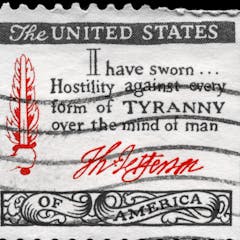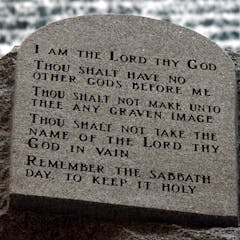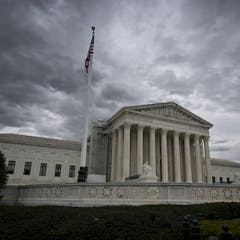
Articles on US Constitution
Displaying 1 - 20 of 287 articles

What happens if the highest court in the land loses legitimacy?

How does someone with power and fame walk away from it? It’s not easy, as these three examples from politics and sports show.

More than 2,000 letters between the two founders are available online. Many attest to their deep commitment to religious freedom.

At the core of sovereign citizen beliefs is the denial of the legitimacy of the government. They do not believe they must obey any laws, nor that they can be held to account for lawbreaking.

Lawyers, advocacy groups and think tanks are soliciting historians’ expertise on the history underlying certain Supreme Court cases. Yet this history-for-hire approach raises questions.

The Supreme Court’s approach toward religion in schools has been shifting, creating uncertainty about legislation such as Louisiana’s.

Members of the House of Representatives relish their connection to their districts and their constituents. So why are they called “Congressman” or “Congresswoman” instead of “Representative”?

Legal rulings throw fate of special scholarships for ethnic minorities into doubt.

Some people refuse to file tax returns or pay all of their income tax due to moral or ethical concerns. The IRS warns that they, like more selfish tax scofflaws, may face penalties.

Despite several efforts to delay the case involving hush money payments to a porn star, Donald Trump becomes the first former US president to go on trial on criminal charges on April 15, 2024.

Members of the military take an oath before service, but it’s to the Constitution, not a specific person. West Point professors explain how young officers learn the importance of their allegiance.

Years of research about the people who work in the federal government finds that most of them are devoted civil servants who are committed to civic duty without regard to partisan politics.

These cases have asked the justices to consider how to apply some of the most sweeping constitutional protections – those of free speech – to an extremely complex online communication environment.

A Georgia election law scholar explains what’s behind the ruling and what it means for the state’s prosecution of Trump.

Right from the very beginning of the nation, there have been rules that limit the ability of the people to choose their leaders.

Experts explain the context behind the Supreme Court’s ruling on Donald Trump’s eligibility to appear on presidential ballots.

Whatever its decision, the court risks once again being seen as politically partisan.

US law has long held that those who support rebels and insurrectionists are just as guilty of treason as those who support foreign enemies.

Adolf Hitler’s rise to power was aided by courts and lawyers in pre-war Germany. A similar situation exists today in the United States.

The first shoe has dropped in the Supreme Court’s process of considering whether Donald Trump is eligible to be president.
